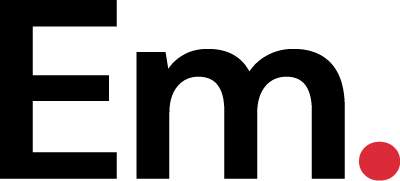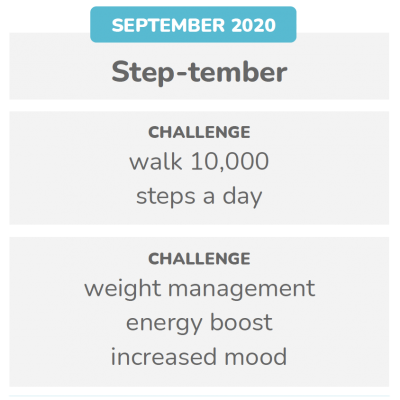
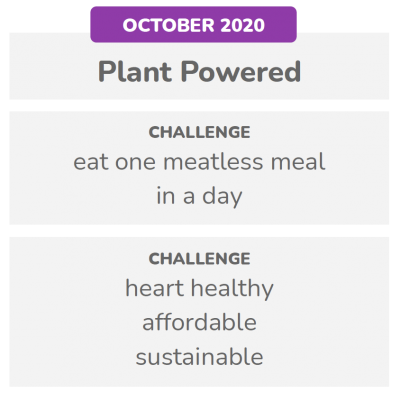
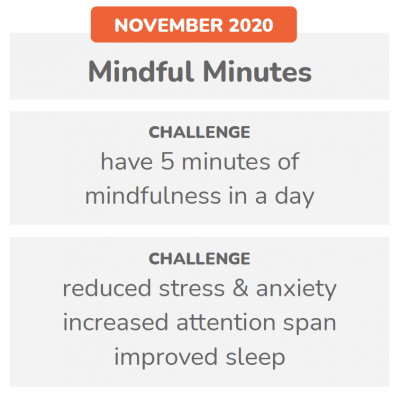
The project
Covid-world corporate wellness.
It started as an internal wellness challenge during our first summer of work from home, but quickly grew into a beta program incubated inside our mid-pivot startup. We noticed a gap in the market for wellness programs designed for a socially distant WFH world. Companies were desperate for anything they could use to keep their employees both healthy, but also engaged with each other.
This journey spanned from May to November 2020. Skip to the journey.
Tapping into competition.
The first draft of this program included giving all users who met the daily goal 70% of the days in a challenge a $20 VISA gift card. However, after surveying and interviewing alpha testers we learned that almost none of our users were motivated by the external monetary reward.
Instead alpha users were primarily motivated by intrinsic values of competition and bettering oneself, as well as the social aspect of experiencing the challenge with others, and gathering (socially distanced in a park) with everyone who joined the "winner's circle" to celebrate at the end. The FOMO pushed some straggling alpha users over the finish line in the end.
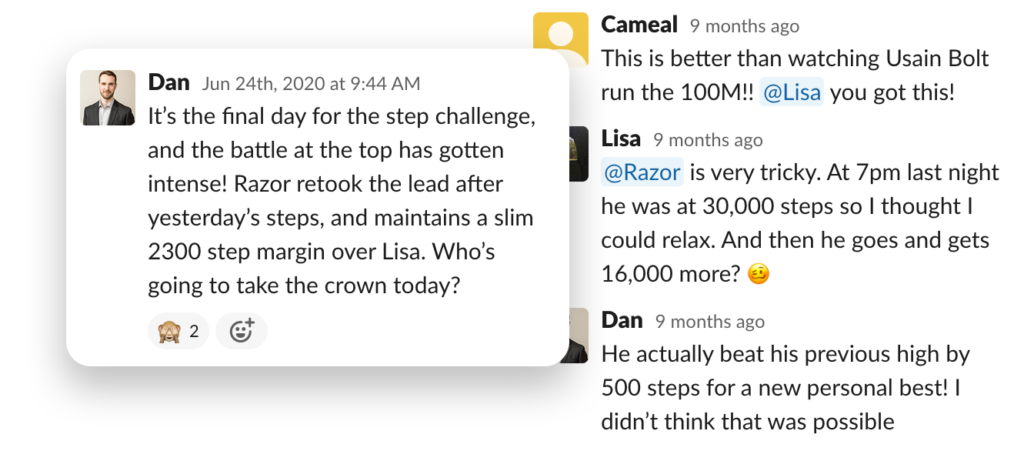
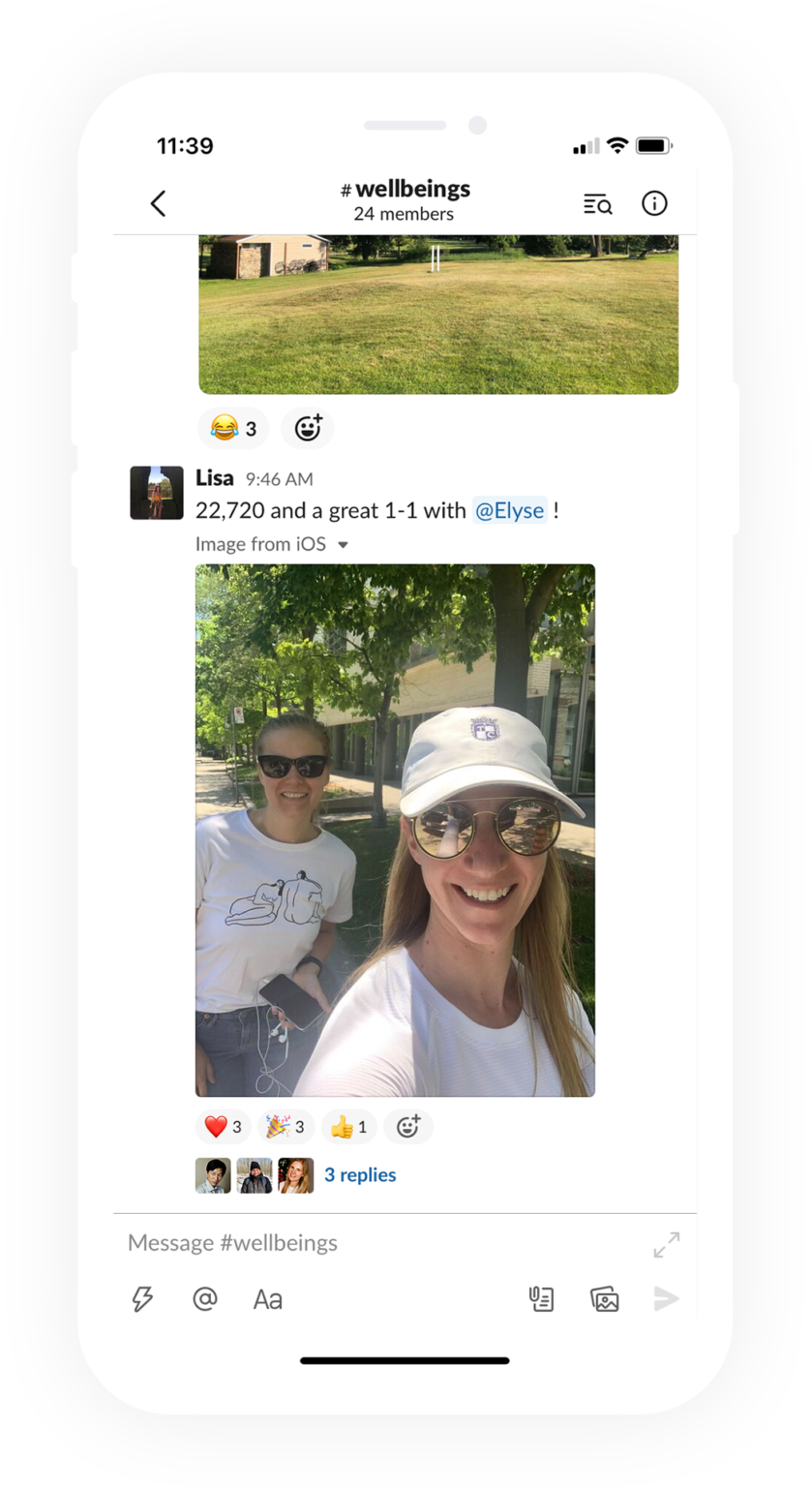
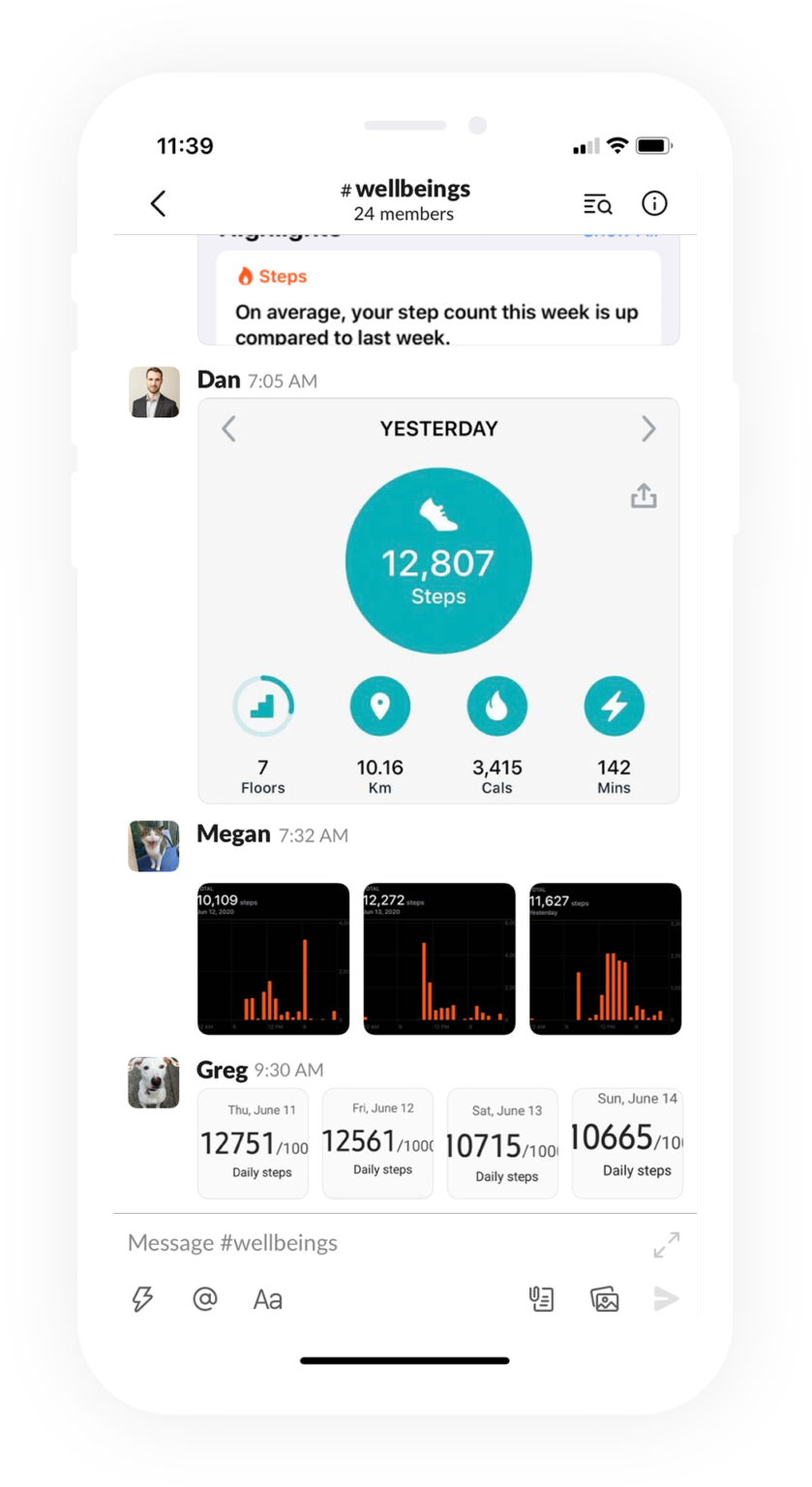
Engagement over accountability.
The initial version of the feed relied on users sharing screenshots of their step count to prove that they did the steps, but engagement metrics told us early that alpha users were much more likely to engage with a photo or a story rather than a screenshot.
By choosing to trust our users, engagement improved. However, relying on trust also made the product harder to scale. We knew eventually we would have to build accountability back into the app in some way.
alpha to beta: experience
Natural language at the core.
It was important moving into the beta that we didn't just automate the data, but we kept the same experience at the core. With a bot installed, it should still feel like chatting with your coworkers about the healthy thing you did yesterday.
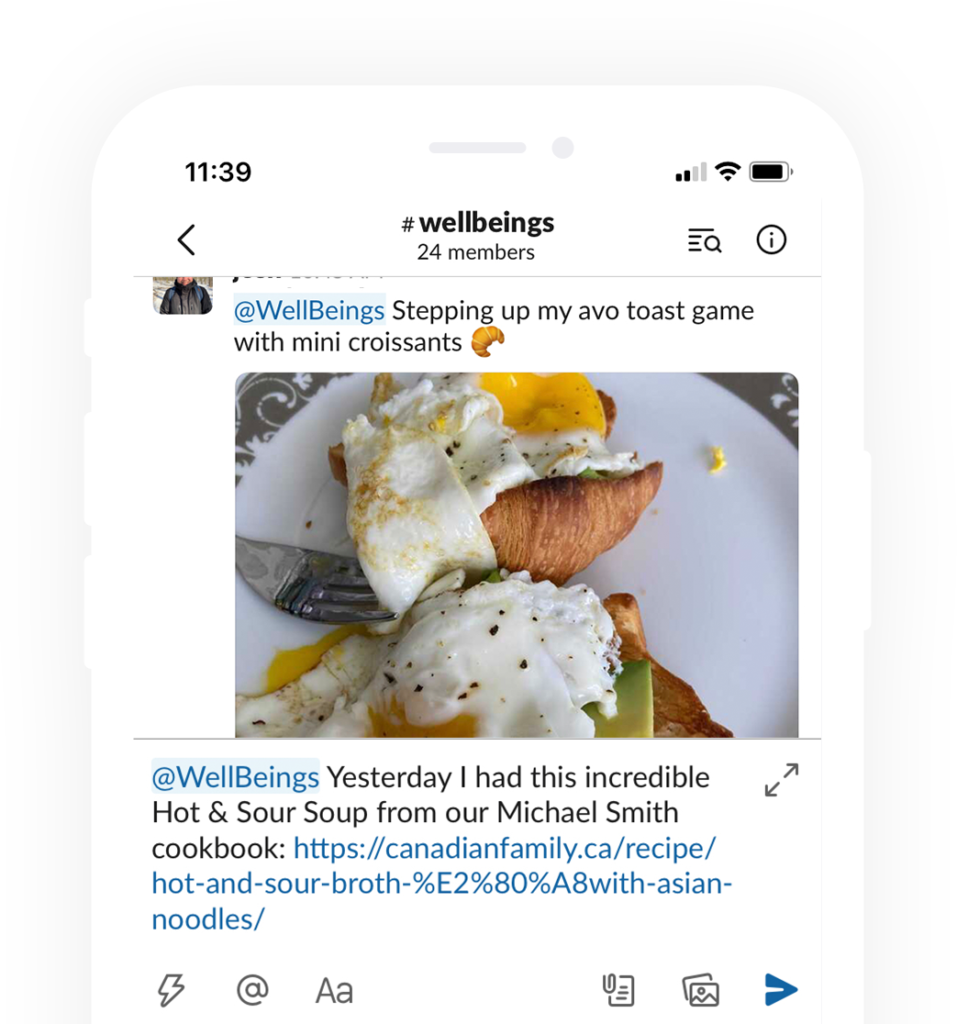
beta companies
A friends & family beta.
10 startups total participated in a 3-month beta from September - November 2020.
Wellness where work happens.
Our beta iteration in the form of an automated Slack app allowed users to participate similarly to the alpha in natural conversational style. The app would crunch the numbers and display the stats, and the team captains would only be responsible for creating & encouraging their team.
Block kit interactions.
Slack's UI builder Block Kit did the heavy lifting on interface. We used strategic messaging and interactions to make the user experience as intuitive as possible.
alpha & beta: Full Journey
Step challenge alpha.
June 2020
A bit of healthy competition on our team, we encouraged coworkers to aim for 10,000 steps a day and post a screenshot with their step counts into a Slack channel.
LEARNINGS:
We quickly learned that screenshots do not make up an engaging feed and asked instead to send a photo from their walk while writing in the step count. This challenge had 100% engagement.
Daily gratitude alpha.
July 2020
In wanting a deeper connection with our coworkers and a more engaging feed, we encouraged employees to post a photo in Slack of something they were grateful for every day.
LEARNINGS:
Unfortunately, we learned that publicly posting gratitude instead of privately noting it made some feel a pressure to post a perfect photo and caption, similar to social media.
Plant-powered alpha.
August 2020
Not just focused on health but on sustainability, we encouraged coworkers to eat at least one plant powered (meatless) meal daily and to post a photo to Slack.
LEARNINGS:
This challenge however, was disproportionately easy for those who were already plant-based and the only engagement they had was staging a nice photo and engagement dropped.
Sales & scoping.
June - July 2020
Our sales team reached out to startups our team had relationships with to see if there was a wider interest for a product that could deliver both employee connection in a covid world, and wellness benefits. Interested companies were signed up for a friends & family beta.
Expanding scope.
July - August 2020
Our team pushed the ideas forward looking to improve on the alpha concepts based on our learnings. We scoped out features and content, and scrapped the gratitude challenge for a mindfulness challenge which we performed a mini-alpha test of before pushing it to the beta.
First development sprint.
August 2020
The MVP development team consisted of a project manager, product manager, UX designer, and an outsourced team of developers experienced in Slack's API. We met weekly working in agile sprints. The challenges took roughly a month each to develop & run initial testing.
Steptember beta.
September 2020
Beyond automating the scores, we made no changes to the step challenge. All of the beta companies LOVED the step challenge.
LEARNINGS:
Users wanted more flexibility in how to earn their steps, many using a conversion chart to calculate steps from other activities.
Plant-powered beta.
October 2020
In order to increase engagement, we introduced a points system allowing up to 7 points a day for a 100% plant-powered day.
LEARNINGS:
Adding point values to meals did not address the disparity between types of diets and was triggering for some folks with eating disorders. Engagement dropped.
Mindful minutes beta.
November 2020
This was the first challenge to feature an increasing difficulty. Users would start with a daily goal of 5 minutes daily and add 5 minutes per week.
LEARNINGS:
While some struggled getting to 5 minutes, others found it too easy. Engagement was extremely low universally and we developed the term "challenge fatigue" for long-term testers.
beta: feedback methods
Forming relationships.
Interviews were our primary source of qualitative data. We kept interviews informal and low structure to encourage candid feedback.
All of the beta channels had a WellBeings Pro observing how each team engaged with the app. Weekly meetings allowed us to discuss the differences between team engagement methods, which interviews helped contextualize further.
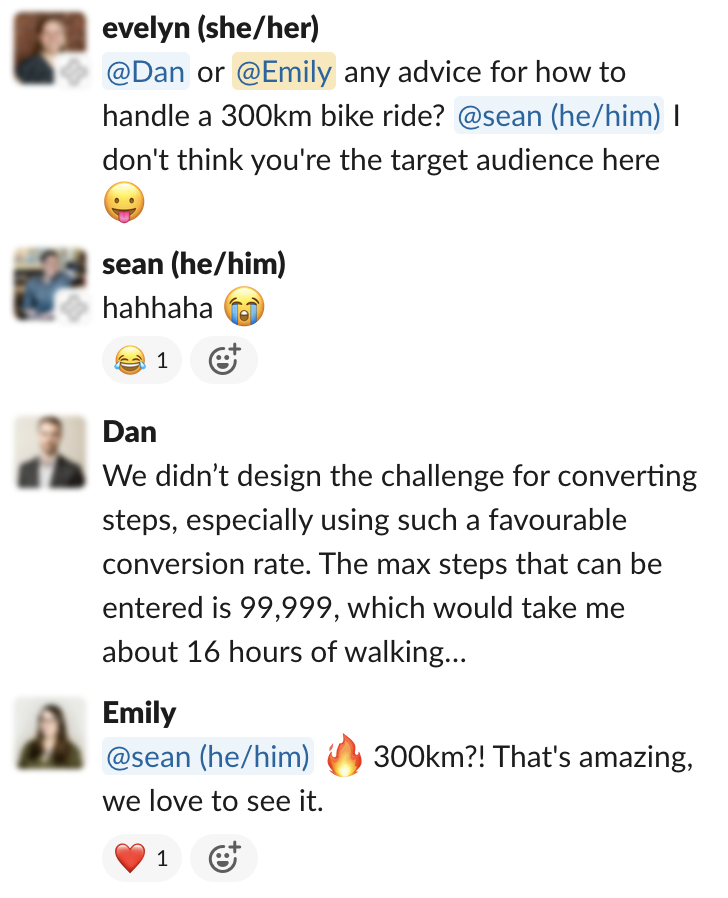

Feedback & learnings
